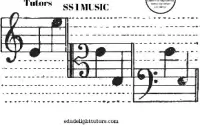First Term Examination Questions Comprehensive Examination of Bookkeeping Topics Book Keeping SS 1 First Term Lesson Notes Week 12
Week 12: Examination of Bookkeeping Topics Covered in the First Term
Exam Instructions
For Students:
- Read all questions carefully before answering.
- Write your answers clearly in the spaces provided.
- Do not talk to other students during the exam.
- Keep your eyes on your own paper to avoid cheating.
- If you have a question, raise your hand for assistance.
- Do not bring any unauthorized materials, such as notes or electronic devices, into the exam room.
- Complete all parts of the exam.
- Review your answers before submitting your paper.
- Be honest and do your best; there are no penalties for making mistakes.
For Teachers:
- Ensure all students understand the exam instructions before starting.
- Provide a quiet environment free from distractions.
- Monitor students closely to prevent cheating.
- Collect all unauthorized materials before the exam begins.
- Be available to answer any questions that students may have during the exam.
- Encourage students to focus on demonstrating their knowledge honestly.
- Provide necessary materials, such as pens, pencils, and answer sheets.
- Ensure that the exam questions are clear and unambiguous.
Part A: Objective Questions
30 Fill-in-the-Blank Questions with Options
- Bookkeeping helps businesses track their ________.
- a) Customers
- b) Finances
- c) Inventory
- d) Suppliers
- An ________ is a document requesting payment for goods or services.
- a) Invoice
- b) Receipt
- c) Voucher
- d) Statement
- A ________ provides proof of a payment made by a buyer.
- a) Credit Note
- b) Receipt
- c) Debit Note
- d) Invoice
- Source documents are important for maintaining ________ records.
- a) Financial
- b) Personal
- c) Verbal
- d) Visual
- A ________ notes the amount owed to a seller.
- a) Voucher
- b) Credit Note
- c) Receipt
- d) Invoice
- Debtors are people who ________ money to a business.
- a) Lend
- b) Borrow
- c) Owe
- d) Invest
- ________ are the things that a business owns.
- a) Liabilities
- b) Assets
- c) Expenses
- d) Revenue
- The main purpose of bookkeeping is to track ________ and expenses.
- a) Prices
- b) Income
- c) Sales
- d) Trends
- An asset’s value can change based on ________.
- a) Market conditions
- b) Seller’s demand
- c) Buyer’s choice
- d) Business name
- A ________ summarizes transactions between a buyer and seller.
- a) Statement of Accounts
- b) Invoice
- c) Receipt
- d) Voucher
- Credit notes reduce the amount ________ by a buyer.
- a) Credited
- b) Invoiced
- c) Debited
- d) Paid
- Stock valuation helps businesses understand their ________ worth.
- a) Inventory
- b) Product
- c) Cash
- d) Service
- A voucher serves as proof of ________ authorization.
- a) Transaction
- b) Payment
- c) Sale
- d) Purchase
- Business transactions can involve goods or ________.
- a) Services
- b) People
- c) Locations
- d) Ideas
- Source documents must be kept for ________ and verification.
- a) Shopping
- b) Audits
- c) Sales
- d) Inventory
- A debit note is used to correct ________ on an invoice.
- a) Payments
- b) Errors
- c) Quantities
- d) Values
- ________ are financial obligations a business must pay.
- a) Assets
- b) Liabilities
- c) Equities
- d) Profits
- Accurate bookkeeping can help prevent ________ issues.
- a) Financial
- b) Personal
- c) Legal
- d) Employment
- The primary function of a bookkeeper is to record ________.
- a) Expenses
- b) Sales
- c) Transactions
- d) Profits
- Businesses need to classify their assets and ________ for better management.
- a) Resources
- b) Liabilities
- c) Revenue
- d) Customers
- A business transaction usually involves a ________ exchange.
- a) Financial
- b) Verbal
- c) Social
- d) Physical
- A statement of accounts shows the ________ between parties.
- a) Relationship
- b) Transactions
- c) Agreement
- d) Statement
- A receipt confirms that a payment was ________.
- a) Recorded
- b) Made
- c) Required
- d) Scheduled
- Creditors are individuals or businesses that are ________ money.
- a) Owing
- b) Owed
- c) Collecting
- d) Lending
- A business should maintain ________ source documents for accuracy.
- a) Proper
- b) Limited
- c) Complicated
- d) Irregular
- Stock valuation assists in ________ financial decisions.
- a) Complicated
- b) Smart
- c) Poor
- d) Unrelated
- Bookkeeping records must be kept ________ and organized.
- a) Randomly
- b) Neatly
- c) Infrequently
- d) Casually
- An invoice lists the ________ of goods sold.
- a) Quantity
- b) Quality
- c) Price
- d) Both a and c
- Proper bookkeeping practices lead to better ________ decisions.
- a) Financial
- b) Random
- c) Marketing
- d) Social
- Maintaining records of source documents is essential for ________.
- a) Audits
- b) Purchases
- c) Sales
- d) Management
Part B: Theory Questions
30 Simple Short Answer Questions
- Define bookkeeping in your own words.
- What is the main purpose of an invoice?
- List three types of source documents and their purposes.
- Explain the difference between debtors and creditors.
- What are assets, and why are they important?
- Describe what liabilities are and give two examples.
- How does stock valuation help a business?
- What is a voucher used for in bookkeeping?
- Explain why source documents are necessary.
- What does a statement of accounts include?
- Why is it important to classify assets and liabilities?
- Describe the role of a bookkeeper.
- How can accurate bookkeeping benefit a small business?
- Provide an example of a business transaction.
- What information should be included in a receipt?
- How can poor bookkeeping practices affect a business?
- What is a credit note, and when is it used?
- Describe how to maintain accurate records for audits.
- Why are financial records important for a business?
- Explain the significance of financial accountability in bookkeeping.
- How does stock valuation impact business operations?
- What is the role of technology in modern bookkeeping?
- What are the consequences of not keeping source documents?
- Define a business transaction in simple terms.
- How do financial statements rely on bookkeeping records?
- Describe how to handle discrepancies in financial records.
- Why is consistency important in bookkeeping?
- What should a business do with outdated source documents?
- How does accurate bookkeeping help in tax preparation?
- What ethical considerations should bookkeepers keep in mind?
Part C: True or False Questions
30 True or False Questions
- Bookkeeping is only about recording sales transactions.
- False
- A receipt confirms a payment has been made.
- True
- Debtors are people who lend money to a business.
- False
- Credit notes increase the amount owed by a buyer.
- False
- Source documents are not important for accurate bookkeeping.
- False
- Liabilities are financial obligations that a business must pay.
- True
- Stock valuation is only necessary for large companies.
- False
- A voucher is proof of payment authorization.
- True
- Bookkeepers do not need to understand the financial laws.
- False
- Creditors are individuals or businesses owed money by others.
- True
- All businesses need to keep accurate bookkeeping records.
- True
- An invoice is a request for payment.
- True
- Bookkeeping only involves physical documents.
- False
- Business transactions can involve exchanges of services.
- True
- A debit note is used to reduce the amount owed by a buyer.
- False
- Source documents must be stored for future reference.
- True
- Assets and liabilities are unrelated in bookkeeping.
- False
- Accurate records can help prevent financial fraud.
- True
- A statement of accounts can show outstanding debts.
- True
- Bookkeeping is a one-time activity for businesses.
- False
- A credit note is issued after a return of goods.
- True
- Liabilities are considered what a business owns.
- False
- Stock valuation is irrelevant for service-based businesses.
- False
- A business transaction must involve money.
- False
- Receipts should be organized for easy access.
- True
- Debtors are always reliable for repayments.
- False
- Bookkeeping helps in strategic business planning.
- True
- All financial transactions require source documents.
- True
- Maintaining records can help in customer disputes.
- True
- Ethical bookkeeping practices can enhance a business’s reputation.
- True
Part D: Fill in the Gaps Questions
30 Fill-in-the-Blank Questions Without Options
- Bookkeeping is the process of recording financial ________.
- An invoice is a request for ________.
- Source documents serve as proof of ________.
- Debtors owe money to a ________.
- ________ represent what a business must pay.
- An asset is something a business ________.
- A credit note decreases the amount a buyer ________.
- Accurate bookkeeping prevents ________ errors.
- The statement of accounts summarizes financial ________.
- ________ documents are necessary for audits.
- Stock valuation assesses the ________ of goods.
- A receipt confirms that payment has been ________.
- Bookkeepers help track ________ and expenses.
- A voucher is used for payment ________.
- Business transactions can involve ________ exchanges.
- Keeping proper records is important for ________ management.
- Financial statements depend on accurate ________ records.
- The classification of assets and liabilities aids in ________ analysis.
- A debit note is used to correct ________ in billing.
- Proper bookkeeping supports ________ decisions.
- Creditors expect payment within a ________ timeframe.
- All businesses should maintain ________ records.
- Receipts provide evidence of ________ made.
- Ethical practices in bookkeeping foster ________ and trust.
- Stock valuation is important for ________ assessments.
- Source documents should be stored for ________ purposes.
- Bookkeeping helps track ________ trends over time.
- An invoice should include the seller’s ________.
- The main goal of bookkeeping is to provide financial ________.
- Accurate records are necessary for ________ compliance.
Conclusion
- The examination will assess students’ understanding of the topics covered throughout the term. Teachers should ensure that students are aware of the importance of academic honesty and integrity during the exam.
Related Resources
Related
Related posts:
- Book Keeping SS 1 First Term Lesson Notes
- Definition, Differentiation, and Identification of Debtors and Creditors Bookkeeping SS 1 First Term Lesson Notes Week 8
- Business Transactions in Bookkeeping Book Keeping SS 1 First Term Lesson Notes Week 7
- Comprehensive Revision of Bookkeeping Topics Book Keeping SS 1 First Term Lesson Notes Week 11
- Understanding Source Documents in Bookkeeping Book Keeping SS 1 First Term Lesson Notes Week 10
Related Posts

Discounts in Accounting: Trade and Cash Discounts Explained

Understanding Health Services: Ensuring Access to Care and Wellness

Notation in Music : Staff and Tonic Sol-fa :(a) Lines and spaces (stave) (b) Tonic sol-fa (c) Treble and bass clefs (d) Melody in C major
About The Author
Edu Delight Tutors
Am a dedicated educator with a passion for learning and a keen interest in technology. I believe that technology can revolutionize education and am committed to creating an online hub of knowledge, inspiration, and growth for both educators and students. Welcome to Edu Delight Tutors, where learning knows no boundaries.